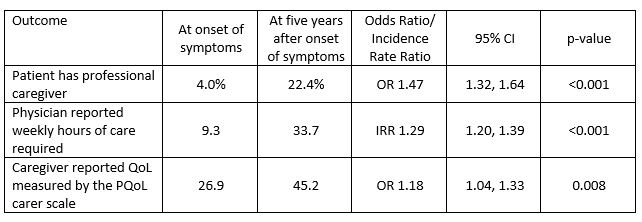Session Information
Date: Monday, September 23, 2019
Session Title: Caregiver Burden
Session Time: 1:45pm-3:15pm
Location: Les Muses Terrace, Level 3
Objective: To understand the relationship between progressive supranuclear palsy (PSP) disease progression and caregiver requirement and burden.
Background: PSP is a rare neurodegenerative disease, and as it progresses, patients become dependent on caregivers for support. Caring for patients with a debilitating disease, such as PSP, could have a negative effect on the caregiver’s quality of life (QoL).
Method: Data from the Adelphi PSP Disease Specific Programme, a point-in-time study of neurologists, their PSP patients and non-professional caregivers in the USA, France, Germany, Italy, Spain and UK, were collected from July to November 2018. Neurologists provided data on the type of caregiver (no caregiver, non-professional only, professional) and the weekly hours of care provided by the main caregiver. Caregiver reported data included the Parkinsonism Carers QoL (PQoL carer) scale, ranging from 0 (least QoL impact) to 100 (highest QoL impact). Ordered logistic, negative binomial, and fractional logistic regressions were used to model the association between reported time of symptom onset and the above outcomes. Odds ratios and incidence rate ratios were produced, contrasting unit increases in time of symptom onset from zero. Analyses were not adjusted for confounding factors.
Results: 203 neurologists recorded data on 892 PSP patients, of whom 649 were community dwelling and had a recorded time of symptom onset. Of these patients, 76 caregivers completed a questionnaire. Physicians reported 59% (386) of community dwelling patients required help with daily needs, 6% (23) of these patients’ caregivers stopped work to care for the patient and 19% (72) had to reduce their working hours. Regression analysis indicated significant associations between time, in years, from symptom onset and caregiver type, physician reported hours of care, and the caregiver reported PQoL carer scale (Table 1). Analysis showed that for each year since onset of symptoms the odds of profession care increases by 47%, the weekly care hours increases by 29%, and the odds of worse caregiver reported QoL increases by 18%. (Table 1) [table1]
Conclusion: As duration from symptom onset increases, PSP patients are more likely to require a professional caregiver. Caregivers spend more time caring for patients and reported lower quality of life. If PSP disease progression could be slowed, this would not only benefit the patients, but may also reduce caregiver burden.
To cite this abstract in AMA style:
Y. Inuzuka, J. de Courcy, J. Pike, J. Mellor, E. Viscidi, A. Paradis, A. Harrington, Y. Zabar. Relationship between Progressive Supranuclear Palsy and Caregiver Burden [abstract]. Mov Disord. 2019; 34 (suppl 2). https://www.mdsabstracts.org/abstract/relationship-between-progressive-supranuclear-palsy-and-caregiver-burden/. Accessed December 26, 2025.« Back to 2019 International Congress
MDS Abstracts - https://www.mdsabstracts.org/abstract/relationship-between-progressive-supranuclear-palsy-and-caregiver-burden/

